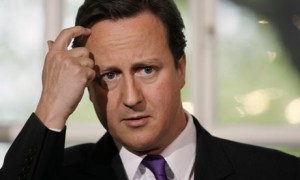David Cameron ha ammesso di trovare “doloroso” lavorare con l’ex capo dell’Ira Martin McGuinness
“L’Accordo del Venerdì Santo è stato molto doloroso, perché voleva dire che persone che avevano fatto cose terribili sono state lasciate fuori dalla prigione.
“Ma alla fine il governo, e io lo sostenevo, pensò fosse giusto fare questa proposta per cercare di porre fine al conflitto.
“Di conseguenza l’IRA ha accettato di porre fine alla guerra, come dicono loro, di mettere fuori uso le loro armi e di perseguire mezzi pacifici”.
David Cameron si riferisce a figure di alto livello tra i Conservatives come Ian Gow e Airey Neave, entrambi uccisi in attentati repubblicani.
“Trovo personalmente molto doloroso quando penso a Ian Gow o Airey Neave – Airey è stato il primo parlamentare che mi ha sempre rappresentato in Parlamento.
“Trovo penoso a volte sedermi attorno ad un tavolo con Martin McGuinness, pensando a ciò che l’uomo ha fatto.
“Ma tutti devono venire a patti con quello perché quello è il prezzo che stiamo pagando per la pace, ed è un prezzo che vale la pena pagare, perché la pace è molto meglio dell’alternativa”.
Il premier ha insistito sul fatto che l’inchiesta sul Bloody Sunday era necessaria, nonostante i suoi costi enormi – e ha sottolineato che ci sono ancora possibili azioni penali in relazione ad altri incidenti durante i Troubles.
“Dobbiamo farci delle domande sul Bloody Sunday, quando 13 persone furono uccise: è giusto avere un inchiesta e andare a fondo di quello che è successo in quel giorno nero nella storia britannica?
“Penso che sia giusto. Ciò non deve sminuire le altre persone che hanno sofferto “.
Tratto da Utv
PM finds McGuinness relations ‘difficult’
David Cameron has admitted he finds it “painful” to work with former IRA chief Martin McGuinness as he defended the Bloody Sunday Inquiry.
“The Good Friday Agreement was very painful because it did mean that people who had done appalling things were let out of prison.
“But in the end the government, and I supported them, thought that it was right to make that proposal to try to end the conflict.
“As a result the IRA did agree to end the war, as they put it, to put their weapons beyond use, pursue peaceful means.”
Mr Cameron referred to senior Tory figures Ian Gow and Airey Neave, who were both killed in republican attacks.
“I find it personally quite painful when I think of Ian Gow or Airey Neave – Airey was the first MP who ever represented me in Parliament.
“I do find it painful that I now sometimes sit around a table with Martin McGuinness and I think about what that man did.
“But everyone has to come to terms with that because that is the price we are paying for peace, and it is a price that is worth paying, because peace is so much better than the alternative.”
The premier insisted that the Bloody Sunday Inquiry had been necessary despite its huge costs – and stressed that prosecutions were still possible in relation to other incidents during the Troubles.
“We have to ask ourselves with Bloody Sunday, when 13 people were killed on that one day, is it right to have an inquiry and get to the bottom of what happened on that very black day in British history.
“I think it is right. That doesn’t in any way detract from other people who suffered.”
